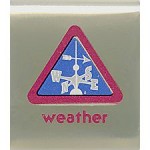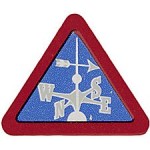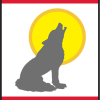Belt Loop
Complete these three requirements
- Make a poster that shows and explains the water cycle.
- Set up a simple weather station to record rainfall, temperature, air pressure, or evaporation for one week.
- Watch the weather forecast on a local television station. Discuss with an adult family member what you heard and saw. Follow up by discussing the accuracy of the forecast.
Academics Pin
Earn the Weather belt loop and complete five of the following requirements.
- Explain to your den or an adult family member the meaning of these terms: weather, humidity, precipitation, temperature,and wind.
- Explain how clouds are made. Describe the different kinds of clouds—stratus, cumulus, cumulonimbus,and cirrus—and what kind of weather
can be associated with these cloud types. - Describe the climate in your state. Compare its climate with that in another state.
- Describe a potentially dangerous weather condition in your community. Discuss safety
precautions and procedures for dealing with this condition. - Tell what is meant by acid rain.Explain the greenhouse effect.
- With your parent’s or adult partner’s permission, talk to a meteorologist about his or her position. Learn about careers in meteorology. Share what you learned with your den or an adult family member.
- Make a weather map of your state or country, using several weather symbols.
- Explain the differences between tornadoes and hurricanes.
- Make a simple weather vane. Make a list of other weather instruments and describe what they do.
- Explain how weather can affect agriculture and the growing of food.
- Make a report to your den or family on a book about weather.
- Explain how rainbows are formed and then draw and color a rainbow.
Resources
Besides books at your local library about weather, the Internet has many weather-related sites. You can learn about the weather all over the world and see radar sweeps that show current weather in any part of the country. Use a search engine to explore. (Be sure you have your parent’s or adult partner’s permission first.) Also, the National Weather Service may have a local office in your area and can be an excellent resource.
Additional Information
.






